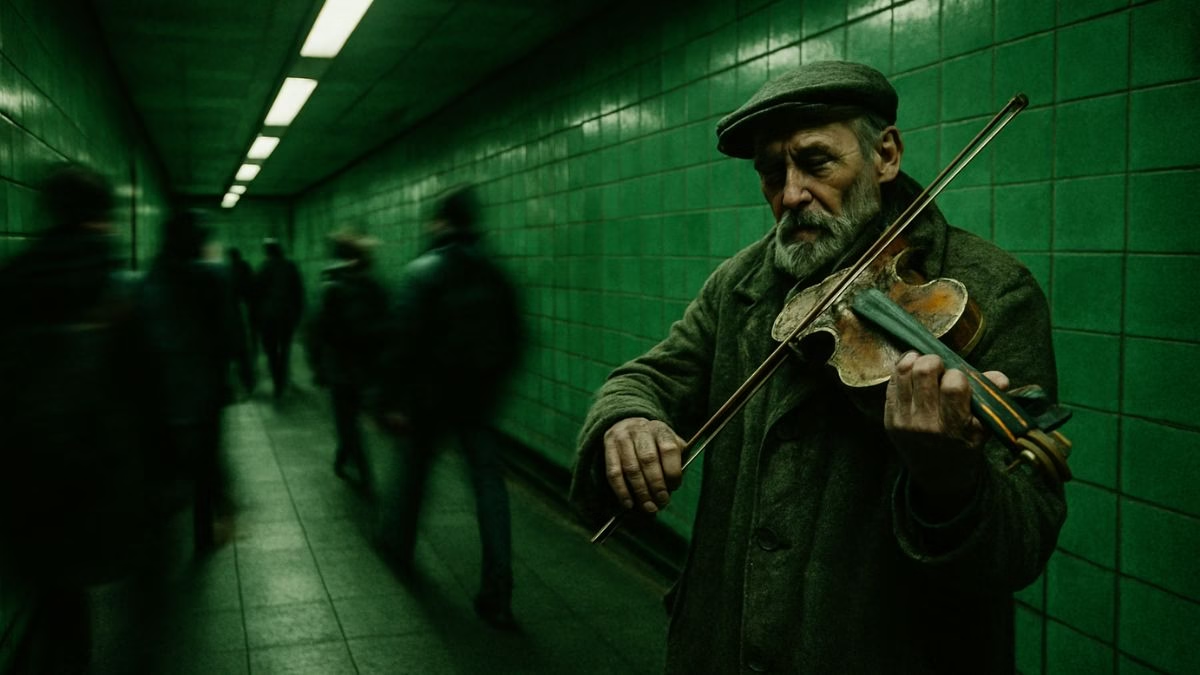Strings in the Metro | A Short Story from When The Rings Stop Ringing by Danny Ballan
The Malostranská metro station in Prague was a cavern of echoes and drafts. Even deep underground, the winter found its way in, riding the currents of air pushed by the rushing trains. It carried the metallic scent of ozone and the damp, earthy smell of the Vltava River flowing just above their heads.
Karel adjusted the collar of his coat. It was a heavy, woolen thing, older than the station itself, smelling faintly of mothballs and rosin. He tucked his violin under his chin, his beard bristling against the wood, and closed his eyes.
He began to play Dvořák’s Humoresque.
It was a piece he knew better than the lines on his own palms—playful, lilting, with a sorrow hidden just beneath the whimsy. His fingers danced over the fingerboard, stiff from the cold but guided by decades of muscle memory.
But to the river of people flowing past him, Karel was not a musician. He was an obstacle.
It was Christmas Eve, and the commuters were in a frenzy. They were a blur of thick coats, shopping bags stamped with foil logos, and glowing smartphone screens. They wore earbuds that sealed them into their own worlds. They rushed toward the escalators, their eyes fixed on the digital clock, counting down the minutes until they could be home, warm and fed.
Karel felt like a ghost haunting his own city. He watched their shoes—leather boots, expensive sneakers, high heels clicking impatiently on the stone tiles. Occasionally, a coin would clatter into his open violin case, a metallic interruption to the music. He never looked to see who threw it. It was rarely an act of appreciation; it was usually an act of dismissal, a toll paid to alleviate a moment of guilt.
I am just background noise, Karel thought, his bow sawing a little harder. I am part of the station’s architecture, like the green tiles on the walls.
The train arrived with a screech of brakes and a blast of wind. The crowd surged forward, swallowed by the sliding doors. In seconds, the platform was empty again, save for the distant rumble of the departing train fading into the dark tunnel.
Karel lowered his bow to rosin it. He was about to pack up—his fingers were beginning to ache—when he noticed he wasn’t alone.
A man was standing near the pillar, just outside the circle of light cast by the overhead lamp. He was young, perhaps thirty, dressed in a suit that cost more than Karel made in a year. A cashmere coat hung open despite the chill, and his tie was loosened as if he had been trying to breathe.
He wasn’t looking at his phone. In fact, his phone was clutched in his hand at his side, the screen dark. He was looking at the floor, his posture slumped, as if the strings holding him upright had been suddenly cut.
Karel hesitated. He lifted his violin again. He expected the man to check his watch and leave. Instead, the man looked up. His eyes were red-rimmed, the kind of raw, shocking redness that comes from sudden, devastating news.
The man didn’t reach for his wallet. He didn’t fumble for change. He simply walked closer, stepping into the music’s space.
“Do you know…” the man’s voice cracked. He cleared his throat, trying to find his professional baritone, but failing. “Do you know Ach, Synku, Synku?”
It was a folk song. Oh, my son, my son. It was a song every Czech child learned, a song of home, of farming, of simple, rhythmic melancholy. It was not a Christmas carol. It was not festive.
Karel looked at the man’s phone, then back to his eyes. He saw the grief there—a fresh, gaping wound. Maybe a wife who had left. Maybe a job lost. Maybe a diagnosis given on the afternoon of Christmas Eve.
“I know it,” Karel said softly.
The man nodded, his jaw tightening. “Please.”
Karel didn’t play it like a nursery rhyme. He slowed the tempo down. He drew the bow long and heavy across the strings, letting the lower notes resonate in the tiled tunnel. The melody was simple, but Karel poured every ounce of his own weariness into it. He played for the empty chair at his own table. He played for the cold in his bones.
The station seemed to hold its breath. The roar of the ventilation fans faded into the background. For three minutes, there was no rush, no holiday panic, no consumer chaos. There was only the wood, the string, and the sorrow.
The businessman closed his eyes. A single tear tracked through the stubble on his cheek. He didn’t wipe it away. He just stood there, letting the music wash over him, allowing the violin to scream the things he was too disciplined to say.
In that moment, Karel realized the truth. He wasn’t a beggar. He wasn’t a ghost. He was a release valve. In a city wound tight with the pressure of forced joy and commercial perfection, he was the only thing offering permission to be sad.
He held the final note until it thinned into silence.
The man opened his eyes. He took a deep, shuddering breath, and then he buttoned his coat. He looked at Karel—really looked at him—and nodded.
“Thank you,” the man whispered.
He didn’t drop a coin. He reached into his pocket and pulled out a bill, placing it gently into the case not with a toss, but with a bow. Then he turned and walked toward the escalator, his back a little straighter, his step a little steadier.
Karel looked down at the money. It was enough for a week’s worth of groceries. But as he clicked his case shut and snapped the latches, it wasn’t the money that warmed him.
He slung the case over his shoulder and walked toward the exit. He wasn’t a ghost anymore. He was necessary. And as he ascended into the snowy Prague night, the silence in his heart felt less like emptiness, and more like peace.
A Prayer for the Melody of Grief
Let us listen now to the notes that fall between the announcements and the rushing trains. Let us speak to the music that dares to weep while the rest of the world demands a smile.
To the sorrow we pack deep into our pockets, hidden beneath the receipts and the wrappings. To the heaviness we carry in our briefcases and our bones, walking through the festive lights while our internal world has gone dark. We are masters of the disguise, experts at the quick pace, the averted eye, the busy walk that says, I am fine, I am fine, I am fine.
Let us confess the exhausting truth to one another: Joy is not a duty. Happiness is not a rent we must pay to exist in this season. Grief does not look at the calendar. It does not respect the holiday. It arrives when it arrives, crashing into the middle of the party, uninvited and awkward, demanding to be felt.
And too often, we run from it. We drown it in noise. We buy things we do not need to fill the silence where the sadness lives. We rush past the old men and the street musicians because we are terrified that if we stop, if we listen to a single bar of a melancholic song, the dam will break, and we will be revealed as human, fragile, and hurting.
Let us ask for the grace to stop running. Let us ask for the courage to stand still in the tunnel, to let the crowd rush around us, and to simply be with our pain.
May we be grateful for the ghosts in our cities—the ones who stand in the corners with their battered instruments and their knowing eyes. They are the keepers of the release valve. They are the ones who say, It is okay to cry here. It is okay to be broken here.
Let us realize that we do not always need to be cheered up. We do not always need a solution, or a distraction, or a “Merry Christmas.” Sometimes, we just need a witness. We need a song that sounds like our own heart breaking, played by a stranger who asks for nothing but a moment of our time.
Let us honor the connection that happens when the facade cracks. When the suit doesn’t matter, and the poverty doesn’t matter, and all that remains are two people sharing the weight of being alive.
May we learn that peace is not always found in the major key. It is not always bright and loud. Sometimes, peace is the quiet, heavy silence that comes after the sad song ends. It is the relief of finally setting down the burden of pretending.
So, let us allow the violin to scream for us when we cannot find the voice. Let us drop the coin, not out of guilt, but out of gratitude. And as we ascend from the underground into the cold night air, may we walk a little lighter, knowing that our sorrow is not a failure, but a shared verse in the long, beautiful, difficult song of humanity.
You are heard. You are allowed to grieve. You are not alone.







0 Comments